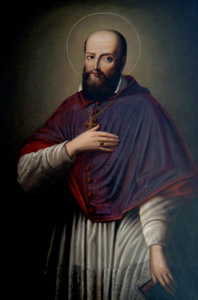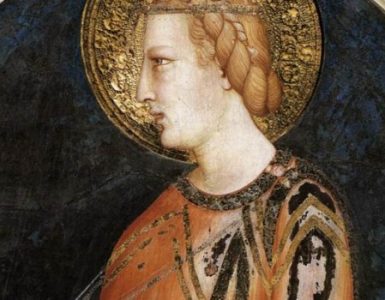
 St. Francis was born in France on August 21, 1567, to aristocratic parents. He had five younger brothers. Francis’ father desired for him to attend college in hopes that Francis would someday be a magistrate. For years, however, Francis felt God calling him to the priesthood, though he never mentioned it to his family.
St. Francis was born in France on August 21, 1567, to aristocratic parents. He had five younger brothers. Francis’ father desired for him to attend college in hopes that Francis would someday be a magistrate. For years, however, Francis felt God calling him to the priesthood, though he never mentioned it to his family.
He attended the colleges of La Roche and Annecy and then studied at the college of Clermont, Paris, under the care of Jesuits from 1583 until 1588. While at Clermont he began a course in theology. Once, while upset over discussions with other theologians about the question of predestination, Francis knelt before an image of our Blessed Mother and made a vow of chastity, consecrating himself to the Blessed Virgin.
In 1592, Francis received a doctorate in law and was about to be appointed a senator. His father even picked a wife for him, but Francis made it clear that he was intent on leading the ecclesiastical life. This did not go over well with his father, who continued trying to push a secular lifestyle on Francis. Then the Bishop of Geneva obtained for Francis the high position of Provost of the Chapter of Geneva. It was the highest office in the diocese, and finally Francis’ father relented. Francis received Holy Orders in the year 1593.
Francis didn’t immediately take to his position. He was not very happy to have his long golden locks cut, nor did he seem to be the most able preacher. Some complained to the bishop that he was conceited and seemed to be talking down to them. But soon Francis came to realize what God had called him to do. He was living during the time of the Protestant Reformation near Switzerland — Calvinist territory. At least 60,000 Swiss Catholics had left the Church to follow John Calvin and become Protestants. Francis decided that he needed to convert these souls back to the true Church.
The diocese could not afford to send anyone with him, nor would his father support what he felt to be a crazy idea. So Francis went to Switzerland with a cousin and spent the next three years having doors slammed in his face, spending nights out in the freezing cold, and sleeping wherever he could find shelter. After three years of this kind of torment and no results, his cousin abandoned him. Francis had not inspired even one conversion, and people were now no longer even opening their doors to him. He would not give up; however, and began writing his sermons on pieces of paper and sliding them under doors.
It seems that Francis had invented what we now call religious tracts. Francis befriended the children; and the parents, seeing how the children trusted him and how kind he was to them, soon started talking to him as well. By the time Francis returned to France, it is estimated that he had converted over 40,000 souls back to Catholicism.
In 1602, Francis was appointed Bishop of Geneva, Switzerland — the heart of Calvinist territory. In 1604, the Lord called Francis into an even deeper relationship with Him. Francis noticed a woman who was listening intently to one of his sermons. He recognized her as a woman whom he had seen in a dream. After his sermon, Jane de Chantal approached him about being her spiritual advisor. Francis was hesitant; he wanted to be sure the direction he took was God’s will. Jane was on the path to becoming a mystic and it wasn’t long after befriending her that Francis felt the Lord calling him in the same direction. Three years after meeting Jane, Francis decided they should form a new religious order. A stranger came and donated a convent to them. This came to be known as the Institute of the Visitation of the Blessed Virgin.
Francis was tireless in his evangelization. He spent hours answering letters and preaching to lay persons. So many came to him for instruction in the faith that he hardly had any time for himself. This was a time when only monks and nuns would receive instruction on the way to holiness. But Francis decided that all people should be allowed to know how to become holier and gave of his time to people from all walks of life. He believed that even those who were very active in occupations could still lead holy lives. His most famous book, Introduction to the Devout Life, was written in 1608 for the ordinary people. It was a huge success all over Europe even though some priests felt it was shameful because Francis was tolerant of some jokes and dancing.
Francis advised busy people of the world to “retire at various times into the solitude of your own heart, even while outwardly engaged in discussions or transactions with others, and talk to God.” He was a great advocate of prayer but cautioned, “To be an angel in prayer and a beast in one’s relations with people is to go lame on both legs.”
Francis died three days after Christmas in 1622.
In 1877, Saint Francis de Sales was declared a Doctor of the Church. He is the patron saint of journalists because of the books and tracts that he wrote which impacted so many lives. In 1923, he was also designated patron saint of the Catholic press.
From Johnnette Benkovic’s Graceful Living: Meditations to Help You Grow Closer to God Day by Day
Our business is to love what God would have done. He wills our vocation as it is. Let us love that and not trifle away our time hankering after other people’s vocations.
— From a letter of St. Francis de Sales
How can “hankering after other people’s vocations” lead me to be discontented with what God has chosen for me? How does it deprive me of grace? In what ways can it lead me into sin?
Prayer
Dear Father, in these days of thousands of religious sects, we truly need the inspiration of saints like dear Francis de Sales. We pray that many will answer Your calling as Saint Francis did to bring our separated brethren home and to bring the Gospel to all. In Jesus’ name we pray. Amen.
Other Saints We Remember Today
St. Timothy (97), Bishop, Martyr, Patron Against Stomach Disorders











